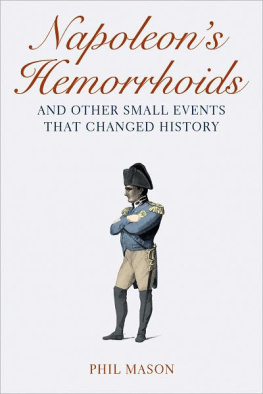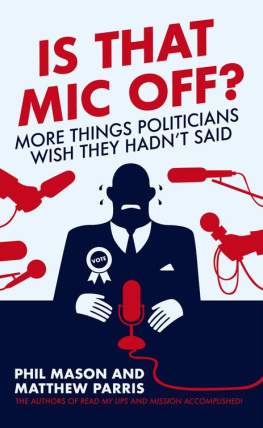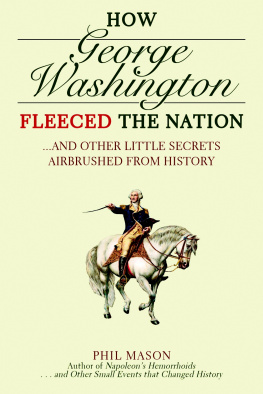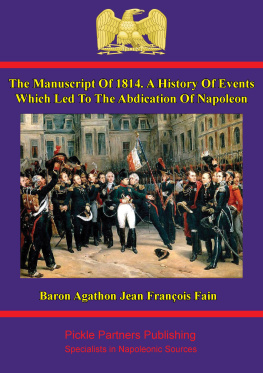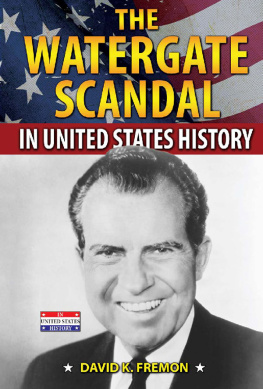Napoleon's Hemorrhoids
... And Other Small Events That Changed History
Phil Mason
Copyright 2009 by Phil Mason
All Rights Reserved. No part of this book may be reproduced in any manner without the express written consent of the publisher, except in the case of brief excerpts in critical reviews or articles. All inquiries should be addressed to Skyhorse Publishing, 555 Eighth Avenue, Suite 903, New York, NY 10018.
Skyhorse Publishing books may be purchased in bulk at special discounts for sales promotion, corporate gifts, fund-raising, or educational purposes. Special editions can also be created to specifications. For details, contact the Special Sales Department, Skyhorse Publishing, 555 Eighth Avenue, Suite 903, New York, NY 10018 or info@skyhorsepublishing.com.
www.skyhorsepublishing.com
10 9 8 7 6 5 4 3 2 1
Library of Congress Cataloging-in-Publication Data
Mason, Phil, 1958
Napoleons hemorrhoids : and other small events that changed
history /
Phil Mason.
p. cm.
Includes index.
9781602397644
1. World history--Anecdotes. 2. History--Anecdotes. 3. World
history--Anecdotes. I. Title.
D24.M36 2009
909--dc22
2009022969
Printed in the United States of America
For Phillip our very own tiny event that changed this household forever, and without whose constant support and encouragement this book would have been finished in half the time.
(with apologies to PGW)
INTRODUCTION
This is a book about tiny events. Tiny events that had big impacts. Some changed the world. Some changed individuals lives and their contribution to the world. Some would have changed the world if matters had turned out just a little differently.
Napoleons attack of piles on the morning of the Battle of Waterloo is said to have prevented him from his usual practice of keeping a watchful eye on progress by riding vigorously around the battlefield. Instead, on that morning he was acutely discomfited, a shadow of his usual self. He was distracted, failed to issue clear orders and delayed commencing hostilities until 11.20am, more than five hours after originally intended. He was eventually to be scuppered in the early evening by the last-gasp arrival of Allied reinforcements in the shape of the Prussians, which leads to the intriguing thought that the tussle might have been over well before they reached the battlefield had Napoleon been his usual driven self.
The Duke of Wellington, who led the winning side that day, famously acknowledged that the encounter had been the closest run thing you ever saw in your life. To his brother on the day after the battle, he wrote, It was the most desperate business I was ever in. I never took so much trouble about any battle and never was so near being beat. So it is entirely conceivable that had Napoleons hemorrhoids not intervened just at the wrong time, the outcome of Waterloo and the future of Europe could well have turned out very differently.

Welcome to the world of if only and what if . This is history with a twist. Napoleons Hemorrhoids tells the tales of how small turns of chance, accident and fate had bigger impacts on the course of history than might have been expected. How Adolf Hitler would have committed suicide years before he ever got near the reaches of power in Germany but for the intervention of a family friend. How the shape of British politics was moulded by a foreign king who couldnt speak the language and a queen who, despite giving birth nineteen times, couldnt leave an heir. How Churchill narrowly escaped with his life three times before becoming Britains salvation in the Second World War. How Harold Wilson triumphed at the polls by forcing a change to the timing of a television programme. And how there may never have been a Thatcher era had Jim Callaghan not bottled out of calling an election in 1978. Or a Reagan era had his attempt to join the Communist Party when he was 27 not been thwarted because the Communists deemed him to be too dim.
The impression of history we get from our schoolteachers and our history books is one of logical progression and reason. Things happen for a reason. Big things happen for big reasons. Napoleons Hemorrhoids explodes this myth. Much of history turns out to be the consequence of small acts of fortune, accident or luck, good or bad.
Great sweeps of history boil down to small moments of chance. We see how the Spanish Armada failed to invade in 1588 despite the British fleet running out of ammunition and sinking just one enemy ship. How the most decisive battle of the American Civil War Gettysburg was fought by accident. How a doctors misdiagnosis can be held to have indirectly led to the First World War. How a drivers wrong turn and a chance cup of coffee led to the assassination that did spark the conflict.
We see how Germany was told early on in the Second World War that the Allies had broken their famed Enigma code, but they couldnt bring themselves to believe it possible so carried on using the penetrated system. How weather forecasters almost cancelled the D-Day landings in favour of a later date, which would have brought catastrophe. How during the Cuban missile crisis American and Soviet planes were just two and a half minutes away from opening fire. How Britains nuclear tests almost took place in Lincolnshire.
Significant decisions that have had historic and lasting impact have turned on the smallest of matters. We see how the Panama Canal was nearly built in Nicaragua but for a postage stamp, and how the United Nations headquarters was headed for Philadelphia until a last minute land deal secured it for New York, and for possibly the least charitable of reasons. How the first to climb Everest shouldnt have been Hillary and Tenzing. How Kennedy shouldnt have been elected president in the first place, and how his womanising just before the fateful day in Dallas directly contributed to his death. How Nixons White House taping system which caused his downfall in the Watergate scandal was revealed by an aide accidentally. And how the 76-year-old Ronald Reagan would have been removed from office by his staff had he shown any signs of incapacity on one particular day in 1987 he happened to be on good form that day, and survived being deposed.
We also cover the worlds of science, arts, sport and business. Each field is replete with instances of major achievement deriving from the smallest of beginnings. How a vast array of inventions came by pure chance. How the introduction of train travel in Britain rested on a lie to Parliament by George Stephenson. How Charles Darwin nearly did not get his trip on the Beagle because of the shape of his nose. How Alexander Graham Bell deceived his way to recognition as the inventor of the telephone. How one of the worlds greatest nuclear scientists became a physicist only because he lined up in the wrong queue at university. And how nearly every moon mission scraped through mission-threatening disasters.
In the field of arts, we witness some of the greatest cultural achievements of history emerging from unexpected origins. How the worlds most successful film nearly wasnt made. And how it was based on one of the worlds highest-selling books that was only written because the author broke her ankle and had to rest up. How the scene voted the coolest in cinema history was entirely ad-libbed because the lead actor was suffering from diarrhoea and was unable to perform the elaborate fight scene that was scripted. We see how celebrated actors secured by chance the parts that made them famous, and others who turned them down. And how many of literatures most renowned works were the result of the smallest and least planned inspirations.

